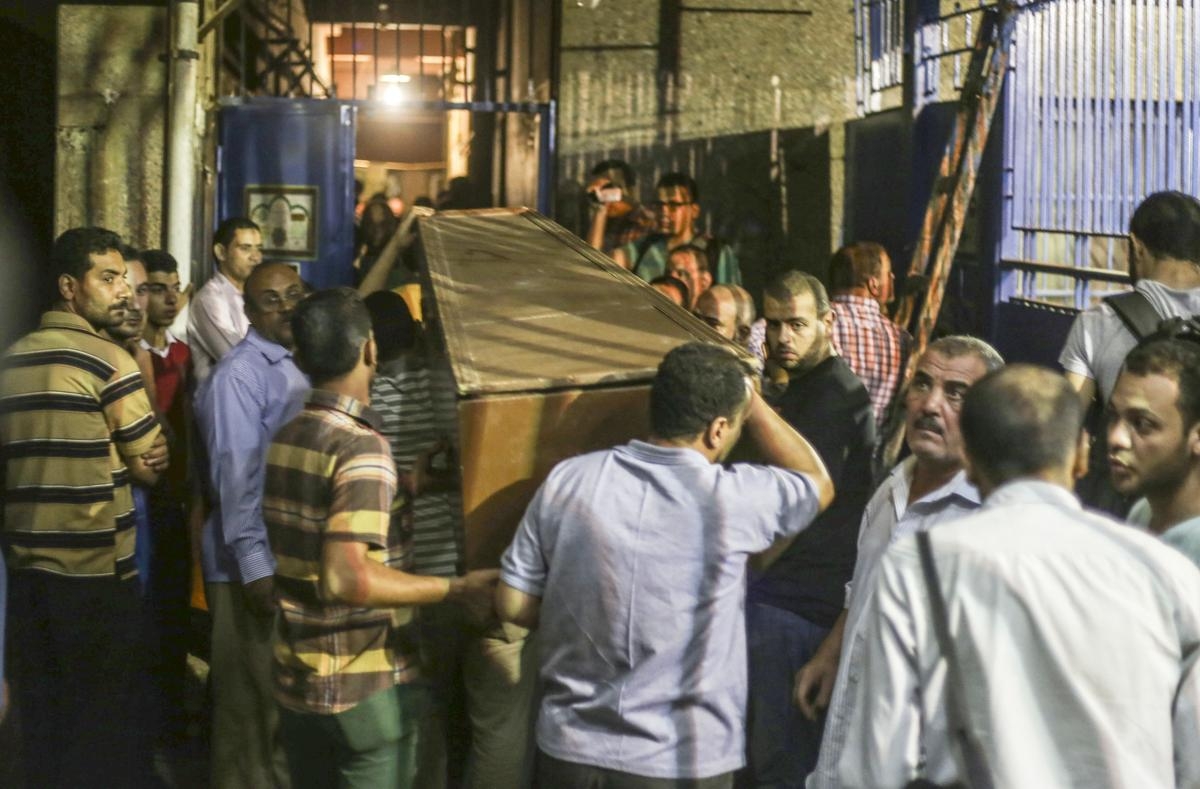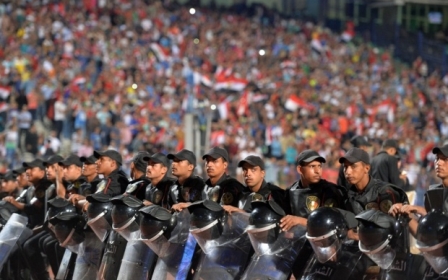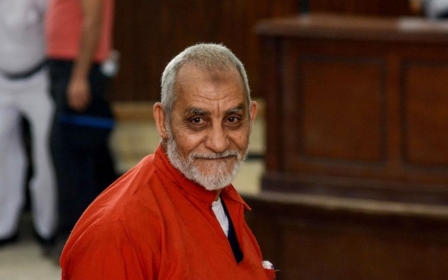Mystery surrounds deaths of Muslim Brotherhood members in Cairo

The last time Alaa Nasser al-Hafi and her family saw her father was on 15 August 2013, one day after Egyptian security forces violently dispersed the Rabaa Al-Adaweya and Nahda sit-ins and killed at least 1,000 protesters, according to Human Rights Watch.
Since then, al-Hafi rarely received news of or from her father. This Wednesday, though, she learned from a phone call that her father was arrested at 11am. “I thought he was arrested normally, but at 2.30 [pm] some of my friends called me and told me to open Al-Jazeera… and then I saw that he had been killed.”
Al-Hafi’s father, Nasser al-Hafi, was a lawyer and a Muslim Brotherhood leader. At one point, al-Hafi was a member of a defence committee in the lawyer’s syndicate, but after the state’s crackdown on the Muslim Brotherhood in 2013, al-Hafi was expelled from this body.
Security forces killed al-Hafi, along with eight more Brotherhood members, after raiding an apartment in which they had been meeting and arresting them in the Sixth of October area of Cairo.
According to the Ministry of Interior’s (MOI), the nine men were “wanted in cases of murder, violent acts, and terrorism” and were killed in an “exchange of fire” with the police. The MOI added in its 1 July statement that the group was organising committees in the Sixth of October area “to plan for the terrorist organisation’s movements in the upcoming period, to undertake terrorist acts and to sabotage important and vital institutions during the 30 June revolution celebrations”.
Accompanying the statement were three photographs - two of which showed blood-stained dead bodies lying next to guns and rifles, and one of the alleged apartment building in which the men were found.
Conflicting narratives
The families of the deceased challenged the official state narrative. Belal Hesham said his father, Hesham Khafagy, a doctor and Brotherhood leader in the Qalyubeya governorate, was sat with the rest of the men discussing patronage for the families of the detained and the dead. According to his son, Khafagy was tried in absentia and handed a death sentence for allegedly “cutting through a Qalyubeya road”.
“None of the men from the Ministry of Interior were killed or even injured,” he said, adding that this proves that the ministry’s story is not true.
Hesham also said that after visits to the Zeinhom morgue, the families were certain that the dead men had been fingerprinted “which means they were arrested and taken somewhere before they were killed”.
It is likely, said family members, that the men were arrested then taken to the Sixth of October police station, where they were killed and then taken back to the apartment to be photographed next to the weapons.
“You can tell from the MOI photographs that there is no blood on the ground,” al-Hafi said.
Afnan Hegazy, a relative of 26-year-old Moetasem al-Eigiezy, said that al-Eigiezy was shot five times. His father, Ahmed al-Eigiezy, previously secretary general of the Muslim Brotherhood’s Freedom and Justice Party, was detained and sentenced to life in prison, but the younger al-Eigiezy did not have any cases against him.
“He was the first to be elected as the student union president of the University of Mansoura after 2011,” said Hegazy.
Mohamed Lotfy, the head of the Egyptian Coordination for Rights and Freedoms, told Middle East Eye that “the situation has a lot of question marks surrounding it,” and there were conflicting narratives.
“There are those that say that [the nine men] were detained and then the family members were called and told to come pick up the dead bodies, and there is the Ministry of Interior’s story which claims that these men had weapons,” said Lofty.
He added that there are also claims that “at least five of the men were lawyers that were talking about how to monetarily support detainees, create defence committees and keep track of their detainees”. So are the deaths of these men part of a process of eliminating the opposition, he asked, adding that “there are many question marks”.
After the assassination of Egypt’s Prosecutor General Hisham Barakat on 29 June, President Abdel Fattah al-Sisi stated that “the hand of justice is tied,” and that hearings should be sped up and appeals processes should be circumvented.
“If there is a death sentence, a death sentence shall be enforced,” al-Sisi said.
“If the president considers the law too restrictive … well the law is supposed to be restrictive,” said Lofty. “The state gets to use a monopoly over violence to organise society in exchange for citizens giving up the use of violence. This means that the law is the only thing standing in the state’s way of abusing this monopoly over the use of weapons.”
Lotfy added that losing this law would be “catastrophic”.
Human Rights Monitor called the incident “outside the context of law” in a statement on Thursday. The group stated that it was unsure of what happened to four more MB figures that were allegedly also attendees at the meeting.
“It is inadmissible that the Egyptian police consider themselves both a judge and executioner in addition to their own job. It looks as though they investigate, issue rulings and execute sentences that they come up with all at once,” the group said.
New MEE newsletter: Jerusalem Dispatch
Sign up to get the latest insights and analysis on Israel-Palestine, alongside Turkey Unpacked and other MEE newsletters
Middle East Eye delivers independent and unrivalled coverage and analysis of the Middle East, North Africa and beyond. To learn more about republishing this content and the associated fees, please fill out this form. More about MEE can be found here.




